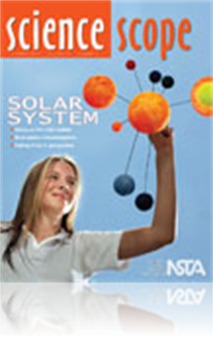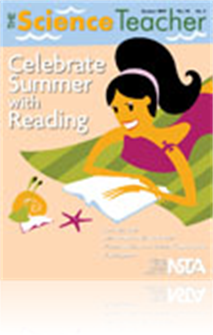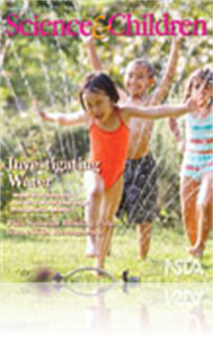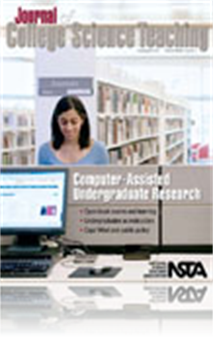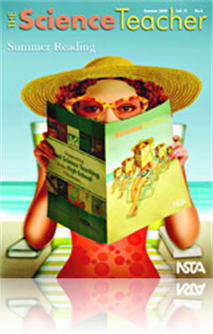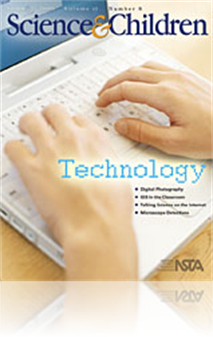All Resources
Journal Article
The Dimensions of the Solar System
A few new wrinkles have been added to the popular activity of building a scale model of the solar system. Students can learn about maps and scaling using easily accessible online resources that include satellite images. This is accomplished by taking...
Journal Article
Reading to Learn Science as an Active Process
One way to help students learn to read science and teach the content simultaneously is by incorporating classroom strategies that actively engage students in thinking, talking, reading, and writing about science. To maximize the probability that stra...
Journal Article
The purpose of this article is to describe a simple laboratory activity in which students collect a series of measurements and then use graphical analysis to determine the nature of the relationship between an object’s mass and the volume of water ...
Journal Article
Idea Bank: Current Events in Science
Create an ambience of focus and organization in your high school science classroom by implementing the strategy described here. This 10-minute silent reading routine exposes students to current events in science and the relevance of science to their ...
Journal Article
Every Day Science Calendar: July 2007
This monthly feature contains facts and challenges for the science explorer. ...
Journal Article
Editorial: A Night at the Circus
Student evaluations of faculty teaching are imperfect and incomplete, but they are here to stay. Students’ ignorance of what it takes to do our jobs would be mostly a source of amusement, except for the fact that many—perhaps all colleges and uni...
Journal Article
“The Dirty Water Challenge” is a fun activity that teaches children about their environment in an engaging and practical way. Inquiry is embedded within the practical—students have to design, plan, and then build their own design of water filt...
Journal Article
Methods and Strategies: Need Money? Get a Grant!
There is no one single place for grants—grants are everywhere, even places you might not think. The internet is one of the easiest ways to locate potential grants. Grants for specialized areas are also often sent through emails. You can find inf...
Journal Article
Teaching for Conceptual Change in Space Science
Nearly 20 years after the release of The Harvard-Smithsonian Center for Astrophysics’ video, A Private Universe, much research has been done in relation to students’ understanding of space-science concepts and how to effectively change these id...
Journal Article
Science Sampler: What to do about Pluto?
Perhaps Pluto is no longer a planet, but does that mean we should remove it from our solar system models? Is it time to order new textbooks, buy new posters, and invent new mnemonic devices? Slow down, no need to panic! Pluto hasn’t gone anywhere o...
Journal Article
College Science Teaching Changing to Mirror Real Science in Turkish Higher Education
College science is often poorly taught and it is rare that any consideration is given to the nine visions for reform of science teaching featured in the National Science Education Standards (NSES) (NRC 1996, p. 52). It is even more rare to see interd...
Journal Article
Time on Your Hands: Modeling Time
Building physical models relative to a concept can be an important activity to help students develop and manipulate abstract ideas and mental models that often prove difficult to grasp. One such concept is time. A method for helping students unders...
Journal Article
Can you imagine a class where students cover the content with each other rather than simply listening to the professor’s lecture? Can you envision students developing their own laboratory investigations and quizzing each other weekly to check for u...
Journal Article
The Case Study: A Symphony for Your Brain
In this case study, students examine an advertisement claiming that listening to classical music in an advertised CD set will enhance their cognitive skills and creativity. Students evaluate the claims and evidence cited to support them and then dete...
Journal Article
Commentary: Summer School … for Teachers
Professional development programs allow science teachers to learn, grow professionally, and even travel. Summer, in particular, is the perfect time for science teachers to participate in professional development opportunities or research possibilitie...
Journal Article
Every Day Science Calendar: August 2006
This monthly feature contains facts and challenges for the science explorer. ...
Journal Article
Perspectives: Cultural Diversity in the Science Classroom
When students come to science class, they bring a variety of perspectives formed in part from their cultural heritage, religious beliefs, and family background. This may create challenges for students whose experiences are different from typical “w...
Journal Article
Point of View: Intelligent Design: Jonathan Wells and the Tree of Life
In recent years, the intelligent design (ID) movement has been very successful in attracting the attention of the general public. The ID movement is centered predominantly at the Center for Science and Culture in the very conservative think tank, th...
Journal Article
Although weather, including its role in the water cycle, is included in most elementary science programs, any further examination of raindrops and snowflakes is rare. Together rain and snow make up most of the precipitation that replenishes Earth’...
Journal Article
Teacher’s Toolkit: It’s a big, busy solar system
Anyone who teaches about the solar system can’t help but be impressed by the vast array of solar system objects, all of the robotic explorers, and the rapidly evolving view of each object and the systems they inhabit. Far from being a disconcerting...
Journal Article
Science Sampler: The Science Belief Quiz
The Science Belief Quiz is an online instrument that was developed to assess and increase student understanding of science concepts and to combat misconceptions. The following are four items from the quiz related to astronomy. A follow-up teacher dem...



